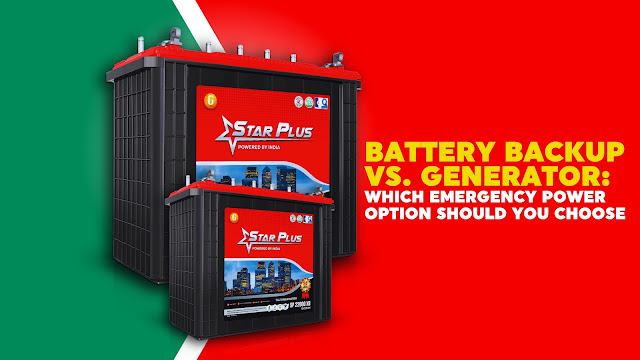Nigeria is a country where regular power outages are expected. To cater to this issue, people have to rely on alternative modes of power, such as generators or battery backups. Thankfully, the leading battery companies in Nigeria, Lagos, are working relentlessly to manufacture inverter batteries to meet the power demands of common people. Generators are also a viable power backup solution for the people of Nigeria. These two power backup solutions are well-suited for the common people and their power needs. While each of these two has its own advantages and drawbacks, both of them are quite well-known to people and used by them to meet their power requirements.
But which one is better? Which one will aptly suit your power requirements? These are the questions you must know the answer to when selecting a power backup solution for your home or office. Knowing about these two can help you make an informed decision. So, here is a comparative discussion on generators and battery backups and which one you should choose for your home.
What is a Home Battery Backup System?
A home battery backup system stores energy and supplies power in case of power outages. They generally run on electricity and offer power when needed. They do not generate electricity on their own. They store the energy and deliver it when needed. Battery backup systems are generally used for uninterrupted power in homes or critical devices or systems, such as data centers, hospitals, and emergency services.
How Does It Work?
A home battery backup system consists of three components- an inverter battery, an inverter, and a charge controller. The battery does the task of storing energy from the main supply, and the inverter converts the stored energy into AC, which your appliances run on. The charge controller regulates the electricity between the inverter and the battery.
Pros and Cons
Pros
- Battery backup systems deliver instant power during outages, making sure critical devices do not run out of power even for a second.
- Maintaining them is easy and straightforward and does not require much of it.
- No harmful gas emission.
- Runs quietly without making much noise.
- Efficient and provide reliable power.
Cons
- They can provide power for a limited period. The time for which they can supply power depends on the battery capacity.
- The initial cost is high.
- The lifespan of these batteries is limited, and you need to replace them with new ones when they die completely.
What is a Home Generator?
The home generator system supplies power in case of outages. These too provide a continuous power supply. As soon as the power goes off, these systems come into play and power your appliances for uninterrupted operation.
The difference lies in how they operate. Home generators are fuel-powered, and they generate electricity. The primary fuel used in home generator systems includes natural gas, liquid propane, or diesel.
How Does It Work?
The generators usually work on the principle of internal combustion. They are composed of internal combustion engines that are powered by the burning of fuel. The construction and exact working of the generator would depend on the fuel type used.
Pros and Cons
Pros
- They do not store energy but rather generate it.
- They can provide high power output.
- Generators can provide power output for several hours.
- They are extremely reliable.
- These are a cost-effective option.
Cons
- The maintenance cost is high.
- They can be quite noisy. Even with new-age generators, the sound produced can be quite high.
- They can produce emissions.
Battery Backup vs. Generators: Which One to Choose
The choice between battery backups and generators is tricky as both are efficient power backup systems. The choice ultimately depends on your budget and the power requirements you have.
However, you must keep in mind that generators use fossil fuels, whereas battery backup systems do not do so. So, if you are looking for an environmentally friendly option, you can choose battery backup systems as a reliable power backup option.
But a battery system does not last a lifetime. In fact, the lifespan of a battery backup system is 8-10 years at most. Most of them need replacement much earlier.
However, in most cases, a battery backup system by a trusted battery company in Nigeria, Lagos, is reliable and efficient, making it invaluable for Nigerian homes.





No comments:
Post a Comment